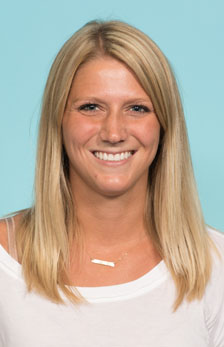Rehabilitation and Participation Science
Program in Occupational Therapy

Emily McLaughlin, OTD/S '18
Clinical Research Track: Health and Disability Research Laboratory
Why did you choose WUOT for your occupational therapy education?
I choose WUOT for my education because it was a school with a lot to offer and a great reputation. When applying to graduate school, WUOT was one of five other schools offering the OTD track, which was something that I was interested in. I wanted to gain more knowledge and experience before I was out in the field and wanted to have the option to possibly teach someday. The research opportunities at WUOT were something that made WUOT stand out to me and made it unique from other schools. After being involved in research during my undergrad and really enjoying it, this was something that I wanted to be able to continue to do. WUOT offered opportunities for research involvement above and beyond my expectations.
Why did you choose the clinical research track option for your degree?
I choose the combined clinical research track option for my degree because I am a hands on learner and wanted to be able to work with people and see how occupational therapy could help people who had been affected by a stroke or a brain injury to live their lives to the fullest. I think that there is a lot to learn from clients and research participants and I wanted to begin that process as soon as possible.
Briefly describe the research lab you chose.
Led by Dr. Alex Wong, the Health and Disability Research Laboratory provides students with the opportunity to get involved in research with stroke patients or cancer survivors. The lab also offers a combined track with the Student Stroke Clinic in order for students to get hands-on experience working in the community practice clinic. There were many project options available to choose from and students could also come in with their own ideas and work with Dr. Wong to develop a project related to their particular interests.
What project/s are you involved with in your lab?
I am working on a project that examines the risk factors for developing post-stroke depression using ecological momentary assessment (EMA) to assess participants in real time and in their natural environments. My goal is to measure the relationship of various biopsychosocial risk factors and their relationship to the development of post stroke depression initially after stroke and again six months post-stroke. In addition, I also want to establish the reliability and validity of using EMA technology with iPhones/iPads to measure post-stroke depression in the stroke population.
How does the clinical research experience contribute (beyond the rest of the set curriculum) to your overall skill and preparation as a generalist practitioner?
The clinical research experience component allows me learn more about stroke, impairments and conditions that can accompany stroke, how to assess these impairments and conditions, and interventions. It gives me the opportunity to work with real clients under the supervision of licensed OTs that other people may not get aside from fieldwork experiences.
What kind of guidance is provided by your faculty mentor?
My mentor, Dr. Wong, listened to my interests and goals and helped me to choose the combined clinical research track as well as narrow in on a project topic. He is always accessible to answer any questions that I have along the way and is available to meet every few weeks to give feedback on the progress that I have made and to give me direction for the next steps that I should be taking.
How would you describe this experience to prospective students who may be interested in clinical research?
The combined clinical research track is a chance to see and work with the conditions and impairments that I am researching in real life. This allows me to have a more holistic view of each person and see how diseases and disabilities affect everyone differently.
How will this clinical research experience contribute to your career?
This clinical experience will contribute to my career as a future OT by giving me more confidence in the skills that I have been learning by allowing me to practice with real clients. Engaging in a research project allows me to better understand not only the stroke population but also research in general. It is teaching me how to find the best sources and how to implement what has been found in practice. Having a better grasp on the research process will make me better able to use evidence-based practice when I graduate.
We welcome inquiries from prospective students, potential collaborators, community partners, alumni and others who want to connect with us. Please complete the form below to begin the conversation.
Schedule an Info Session
We are excited that you are considering applying to the Program in Occupational Therapy at Washington University. Please join us for a Zoom Information Session for either our entry-level MSOT or OTD degrees or our online Post-Professional OTD. Current faculty members will discuss the degree program and answer any question you may have. We are offering these sessions on the following days and times. The content is the same for each one, so you only need to sign up for one.
Upcoming ENTRY-LEVEL Degree ZOOM Info sessions:
Schedule an Entry-Level Info Session
Upcoming PP-OTD Degree ZOOM Info session: